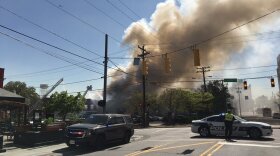Thedeadly explosion in downtown Durham earlier this month happened after a digging crew hit a natural gas line, leaving the combustible gas tofill at least one building.
While this incident resulted in some of the worst destruction in Durham's 150-year history, it's far from the only time an underground utility line was damaged. In 2017 alone, the most recent year for which there is data, 23,000 utility lines were damaged across the state, according to Common Ground Alliance, a group dedicated to the protection of underground infrastructure.
Jason Wheatley, a spokesman for Piedmont Natural Gas, says these damages can cause problems for utility companies who must dispatch repair crews.
"Is it a widespread problem? Do we find it frustrating? The answer to both of those is yes," he said. "It is a problem, it can be dangerous. At a minimum it causes a lot of inconvenience, not just for our employees who could be servicing customers in other ways but, it can snarl traffic, it can shut down roads."
In an effort to reduce harm to gas and other underground utility lines, state officials have established strict guidelines about safe digging practices. And utility companies fund North Carolina 811, the call before you dig hotline.
In fact, anyone who puts a shovel in the ground – even any homeowner replacing something as small as a mailbox – must first call 811 and wait three business days before digging. During that time, marking crews from the utility companies mark any underground lines with paint or flags.
Wheatley claims too many digging contractors don't make that call.
"It is definitely the leading cause of calls that we have to respond to, for those kinds of situations," he said. "You know, it's a free phone call. You do it three days before you plan to dig, and people come out and then mark those underground utility lines. And not just natural gas lines, but water, cable, electric. Everything."
Other excavators do take that first step. The hotline fielded some 2 million calls last year, and Louis Panzer, NC 811 executive director, said calls are already tracking about 20% higher this year.
There are many reasons a line could be damaged, even if the excavator called ahead. A worker with the utility company might mark the line in the wrong spot. A digging machine operator might make an error in judgment. In Durham, the investigation is ongoing, but Panzer confirmed that the digging contractor called 811 before digging.
In 2014, the North Carolina legislature passed a law that codified many of the safe digging practices. That law established a board to adjudicate complaints of unsafe digging. But there isn't a team dedicated to monitoring excavators.
"The important thing to understand about enforcement in North Carolina is that first of all it's complaint based," said Panzer.
But in four years, the board has heard just 200 total complaints. And of those, found violations in just 50 cases and issued a mere 6 fines.
Panzer says most excavators do follow the law, and that most of the damaged lines are a result of accidents.
"[A fine] isn't linked specifically to a damage, it's linked to whether or not there was a violation of the statute," he said.
An earlier version of this story cited Jason Wheatley as a spokesman for PSNC Energy. He is a spokesman for Piedmont Natural Gas.











